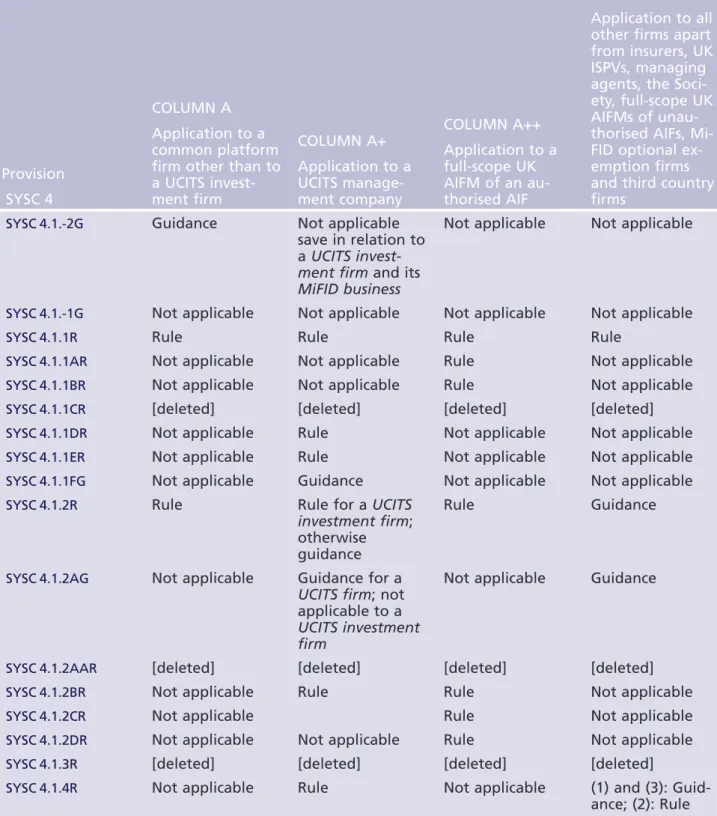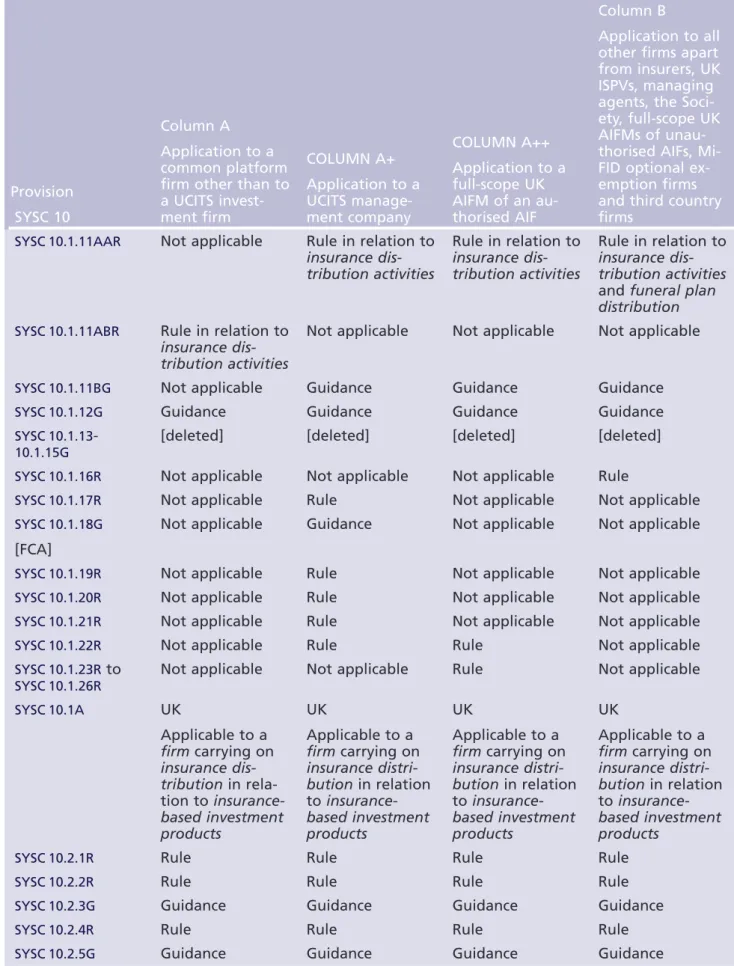Firms to whom ■SYSC 19D applies should also refer to the remuneration section of the PRA rulebook. Such provisions are applied by each regulator to the extent of its powers and regulatory responsibilities. a) the parts of the PRA rulebook which the. The application of each of the chapters■SYSC 19F.2,■SYSC 22on■SYSC 28A is detailed in those chapters.
A company is a significant SYSC company if it meets one or more of the following conditions:. 4) "customer money" means customer money that a company receives or holds in the course of or in connection with all the regulated activities that it carries on:. a) as set out in the most recent client money and client asset report submitted to the FCA under ■SUP 16.12 (Integrated Regulatory Reporting); or. b) (where the firm carries out the assessment under ■SYSC 1.5.4Rat at any time after the date of its most recent report in (a)) as the firm would report to the FCA in accordance with the relevant report as if the reporting period for that report ended on the date of assessment. If a company that is a significant SYSC company ceases to meet any of the conditions in ■SYSC 1.5.2R, it must continue to comply with the rules and requirements. applicable to a significant SYSC enterprise until the first anniversary of the date on which the enterprise ceased to be a significant SYSC enterprise.
The FCA may, on a case-by-case basis, require a firm that does not meet any of the conditions in ■SYSC 1.5.2R to comply with the rules and. requirements that apply to a significant SYSC firm if the FCA considers it appropriate to do so to meet its strategic objective or further one or more of its operational objectives under the Act. For the avoidance of doubt, such a firm would still be a significant SYSC firm for the purpose of the other rules in the FCA Handbook that apply to a significant SYSC firm, unless otherwise expressly provided.
Society
Application of the common platform requirements (SYSC 4 to 10) Who?
Part 1 2. Application of Common Platform Requirements (SYSC 4 to 10) (3) Auxiliary Activities;. 4) ancillary services related to MiFID operations; and (5) joint portfolio management. 1A) Subject to (2), (3) and (6), Articles 33 to 35 of MiFID Org (including any relevant definitions in the Glossary, MiFIR and MiFID Org) shall apply as if they were rules or guidelines under with Part 3 (tables summarizing the application of the Common Platform requirements for different types of firms) to carry on the business of a business specified in SYSC 10.1.1R that is not a MiFID business or an activity regulated by structured deposits. This rule does not apply to an investment company for the management of a collective portfolio in relation to an activity of the company other than its Mi-FID activity.
Rather, the potential impact of a group member's activities, including its systems and controls, and any systems and controls operating on a group basis, will be relevant in determining the appropriateness of the group's own systems and controls. company. 1 Part 2 Application of the common platform requirements (SYSC 4 to 10). 2) are, or are subordinate to, regulated claims management activities. However, if another applicable rule relevant to the activity has a broader territorial scope, the common platform registration requirements will apply with that broader scope in relation to the activity described in that rule.
Subject to the exception for the common platform record-keeping requirements in Section 2.17R of this Appendix, the application of the common platform requirements to firms engaged in regulated claims management activities (and ancillary activities) depends on whether the activity is conducted in Great Britain UK rather than whether it is performed from a UK branch. The organizational requirements of the Common Platform, with the exception of the Financial Crime Common Platform requirements, also apply in a prudential context to a UK resident company and to a foreign company in respect of activities wherever they are conducted. exerted.
CR All other firms (apart from insurers, managing agents, SYSC 1 Annex
Applicable to a firm that continuesApplicable to a firm that carries on insurance distribution in connection- insurance distribution in connection with insurance-based investment to insurance-based investment-.
When fulfilling the requirements from this paragraph, investment companies take into account the nature, scope and complexity of the company's operations, as well as the nature and scope of investment services and activities performed within the scope of this business. . 2 Investment firms shall establish, implement and maintain systems and procedures suitable for protecting the security, integrity and confidentiality of information, taking into account the nature of the information in question. 4 Investment companies establish, implement and maintain accounting policies and procedures that enable them to submit financial reports to the competent authority in a timely manner at the request of the competent authority, which reflect a true and fair view of their financial position. and which comply with all applicable accounting standards and rules.
Investment firms shall take into account the nature, size and complexity of the firm's business, as well as the nature and range of investment services and activities performed in the context of that business. 2 Investment firms shall establish and maintain a permanent and effective compliance function, which shall operate independently and shall have the following responsibilities:. (a) continuously monitor and regularly review the adequacy and effectiveness of the measures, policies and procedures put in place in accordance with the first subparagraph of paragraph 1, and the ac - measures taken to address any shortcomings in the company's compliance with to remedy its obligations; In order to comply with points (a) and (b) of this paragraph, the compliance function shall carry out an assessment on the basis of which it shall establish a risk-based monitoring program that takes into account all aspects of the investment firm's investment services, activities and any relevant ancillary services, including relevant information collected in connection with monitoring complaints handling.
In that case, the investment firm must assess whether the effectiveness of the compliance function has been compromised. 2 Investment companies shall, where appropriate and proportionate having regard to the nature, scale and complexity of their business and the nature and scope of the investment services and activities carried out in the course of that business, establish and maintain a risk management function, which operates independently and performs the following tasks:. a) implementation of the policy and procedures mentioned in subsection Investment firms shall, where appropriate and proportionate having regard to the nature, scale and complexity of their business and the nature and range of investment services and activities carried out in the course of that business, establish and maintain an internal audit function which is separate and independent from the investment company's other functions and activities, and which has the following responsibilities:. a) establish, implement and maintain an audit plan to examine and evaluate the adequacy and effectiveness of the investment company's systems, internal control mechanisms and arrangements.
3 The respective rights and obligations of the investment companies and the service provider are clearly assigned and defined in the written agreement. The agreement ensures that outsourcing by the service provider takes place only with the written consent of the investment company. 1 4 Where the investment firm and the service provider are members of the same group, the investment firm may, for purposes of compliance with this Article and Article 32, take into account the extent to which the firm controls the service provider or has the ability to influence its actions.
5 Investment firms shall, upon request, make available to the competent authority all information necessary to enable the authority to monitor the compliance of the performance of the outsourced functions with the requirements of UK legislation on markets in financial instruments. The cooperation agreement referred to in point (b) of paragraph 1 ensures that the competent authorities of the investment firm can at least: No d) cooperate in enforcement in accordance with national and international law applicable to the third country supervisory authority and the competent authorities in the United Kingdom in cases breaches of the requirements of UK legislation on markets in financial instruments.

